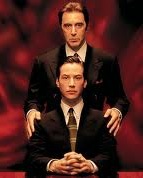 In the movie, “Devil’s Advocate,” Al Pacino is the devil in human form attempting to tempt Keanu Reeves, both of whom play attorneys. Pacino interviews Reeves for a position in his firm and conducts a portion of the interview on the windswept rooftop of a Manhattan skyscraper. There is no railing on the roof and the scene is chilling as Pacino walks along the edge, presumably to demonstrate his lack of fear and his self-mastery.
In the movie, “Devil’s Advocate,” Al Pacino is the devil in human form attempting to tempt Keanu Reeves, both of whom play attorneys. Pacino interviews Reeves for a position in his firm and conducts a portion of the interview on the windswept rooftop of a Manhattan skyscraper. There is no railing on the roof and the scene is chilling as Pacino walks along the edge, presumably to demonstrate his lack of fear and his self-mastery.
Pacino asks Reeves a question that has stayed with me: “Can you summon your talent at will?”
I often ponder the query, and more vitally how to ensure that I can always respond in the positive as Reeves did (though I hope never to the same interrogator).
There are times when you are in your zone, your mood is great. A challenge comes when you are at your daily peak, you have no distractions, and you knock the ball out of the park. There is no need to summon your best. You already are there.
But how about late at night, when fatigue haunts your mind and body, when you are irritated, and have multiple things pulling at the edges of your mind? How about then? How well and quickly can you focus, can you rally, can you instantly summon your best at will?
There are some apropos lines from Rudyard Kipling’s poem,”If.”
…If you can force your heart and nerve and sinew
To serve your turn long after they are gone,
And so hold on when there is nothing in you
Except the Will which says to them: “Hold on.”
…Yours is the Earth and everything that’s in it,
And––which is more––you’ll be a Man, my son.
I once did an anchoring experiment with a graduate class of business students to illustrate the human tendency to anchor on irrelevant data. Several students protested that they did not have enough time, that in “real life” they would have done a better job. I replied that this was real life and there never is enough time, and anyway the experiment specified that they were under time pressure.
So how do you summon your best at will under the “real life” constraints under which we all live?
No magical answers, just a few thoughts to start the process:
– Awareness of the need to be able to do so
– Core belief that you are able to do so
– Practice makes perfect: mental muscles, like physical ones, become stronger with use
Kipling’s poem resonates with me, so I use it to energize and motivate myself at needed moments. I love to play racquetball and at times I’ve had to summon “burning desire” to find the strength to win when I am in need of my second wind. I deliberately remember those moments to serve as evidence of my ability to “summon my best at will.” The more I do it, the better I become.
Can you summon your talent at will?
This is a classic from the NSC Blog archive, originally posted April 29, 2008.


0 Comments